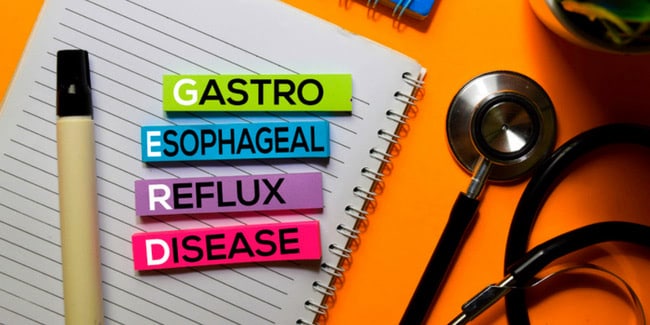
You may be aware that acid reflux, also known as gastroesophageal reflux disease (GERD), can cause painful heartburn and other symptoms. However, you may not understand the true toll of living with GERD. Struggling with acid reflux disease can rob you of your enjoyment of food and of the ability to reap the social benefits that come with sharing a meal with others. You may be too uncomfortable to fully engage in a dinner conversation, or you may be preoccupied with figuring out when to take a medication or what is safe to eat.
The week of Thanksgiving represents National Gastroesophageal Reflux Disease (GERD) Awareness Week, a health holiday that has been recognized since 1999. In honor of GERD Awareness Week, here’s what you need to know about this noxious condition, including how future research could make an impact on the lives of people living with GERD.
What Is GERD?
GERD is a condition that occurs when the contents of the stomach (acidic or non-acidic) escape out of the top opening of the stomach and make contact with the lining of the esophagus. This “reflux” event can happen if the sphincter between the esophagus and stomach is slightly open due to weakness, laxity, or otherwise. As a result, the lining of the esophagus can become irritated by the contents of the stomach, causing many uncomfortable symptoms. If the tissue lining of the esophagus becomes damaged, this type of GERD is known as erosive esophagitis.
Symptoms of GERD
According to the National Institute of Diabetes and Digestive and Kidney Diseases (NIDDK), GERD can cause the feeling of heartburn, which is akin to a burning sensation in the middle of your chest. You may find that you are burping up stomach contents, causing an acidic taste in your mouth. GERD symptoms may be worse when lying down or after a big meal. Other symptoms of GERD may include chest pain (which can be difficult to distinguish from cardiac chest pain), nausea, painful swallowing, difficulty swallowing, throat clearing, coughing, vocal changes, erosion of tooth enamel, and gum inflammation.
Who Is Most Likely to Suffer From GERD?
GERD is a highly common condition, and researchers note that as many as one-fifth of the people in the United States suffer from GERD. Any person of any age can develop GERD; however, it is more likely to affect certain groups of people. These groups include:
- People who are overweight or obese
- Pregnant women
- People who take certain medications
- People with hiatal hernias
- People who smoke cigarettes or are exposed to secondhand smoke
Of the gastrointestinal diseases in the United States, experts note that GERD has the highest direct cost for patients, ahead of colorectal cancer and liver disease.
How to Manage GERD Without Medication
While GERD can significantly affect your daily routine, many lifestyle changes can help you manage GERD symptoms. According to the International Foundation for Gastrointestinal Disorders (IFFGD), the following tips can help you manage GERD symptoms:
- Eat meals earlier in the day
- Eat light foods
- Stay active
- Avoid cigarettes
- Don’t drink juice
- Avoid heavy seasoning
- Limit your alcohol intake
- Avoid fried foods
- Use small plates to avoid eating big portions
- Drink water instead of soda
- Limit sweets and peppermints
- Don’t lie down or go to sleep directly after a large meal
Losing weight and wearing loose-fitting clothing can also help take pressure off your stomach and the sphincter between your stomach and esophagus, reducing the chance that stomach contents will reflux out and cause discomfort.
Treating GERD with Medications
Despite following a GERD-friendly diet and making lifestyle changes, many people still suffer from GERD-related symptoms. It is important to continue pursuing treatment if your GERD is not controlled with lifestyle changes alone because chronic GERD can increase your risk of a precancerous condition known as Barrett’s esophagus. Chronic GERD can also change the shape of the tissue in your esophagus, making it harder for food to pass. Medications that control acid reflux can help reduce the symptoms of GERD; however, they can have side effects, especially when taken long-term. Surgical procedures may help if medications for GERD cannot control symptoms enough or cannot be taken. However, traditional surgery for GERD is invasive, and less-invasive options may be more desirable.
Emerging Treatments for GERD
GERD affects a large swath of the population and has a real impact when it comes to its effects on individual sufferers as well as society as a whole. This is why clinical research for GERD is of the utmost importance. There are many therapies for GERD that are emerging and may have more benefits compared to current treatment options. At M3 Wake Research, we are committed to helping researchers unlock new treatment options for GERD sufferers so that they can get back to living well and enjoying meals—during Thanksgiving festivities and all year round.
